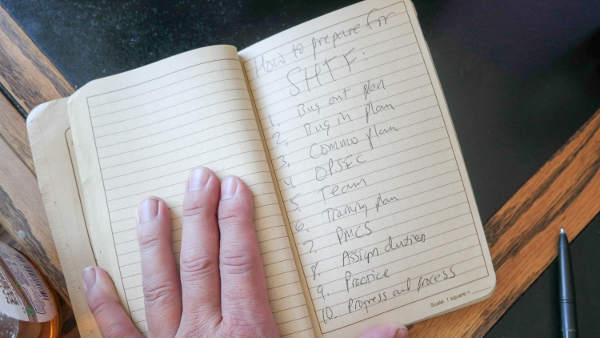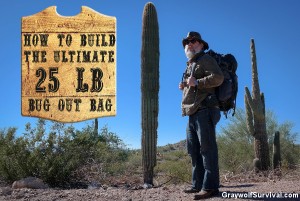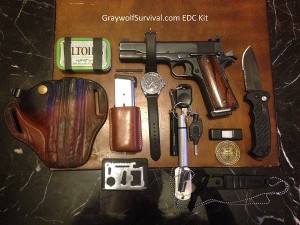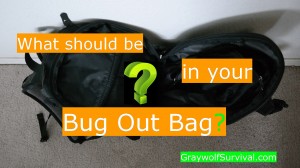There are a lot of things that you need to do if you’re trying to prepare for the worst-case scenarios. I’ve put together a list of 10 things that you should consider doing, but they’re an overall look at your bug out plan in case SHTF.
In case you haven’t heard yet, SHTF stands for Shit Hits The Fan. Life, for a while, isn’t normal and you have to take drastic measures just to cover basic necessities unless you took those drastic measures beforehand. It basically means your entire life has been upended for a while and you have a pretty serious situation to deal with. In the general sense it means society has collapsed and your way of life is now over. In a very real sense (and the way you should really be thinking about it) it’s when something serious happens that disrupts your life to the point that if you didn’t prepare for it, you’d be in a spot of trouble. This could be a tornado, Katrina-esque flood, city-wide riots, total financial collapse, regional- or country-wide power outage, or military takeover.
The first thing you should be doing for SHTF preparedness is coming up with a SHTF plan. In other words, what things are you going to do both before and during a SHTF event such as a natural disaster, fire in your home or the total collapse of society? You should be sitting down and writing up something so you can get all your thoughts in order and so you can share it with your family or whomever you’re going to involve with your survival plan. This should be a 10,000-foot strategic view of your plan. As such, this plan should involve having a few other plans in place to both create and activate. This SHTF plan should involve these ten things, but not all necessarily in this order:
10 steps how to prepare for SHTF
1. Come up with a Bug Out Plan
If SHTF and you have to leave your home, what are you going to do? Do you know where you’re gonna go and how you’re gonna get there? I know a lot of people say that they don’t need a bugout plan because they’ll be bugging in if SHTF.
Bullcrap!
Read bugging in vs bugging out if you want to know my thoughts on the subject.
What are you going to do if you come home and there are twenty armed guys eating your cheetos and rifling through your Playboys? Since you need to plan for an unknown that will change your life, you need to come to grips with the possibility that you may not be able to stay home. There are a lot of reasons why you may have to bug out; a fire could sweep through your neighborhood, a tornado could wipe out your place, a hurricane typhoon could devastate your area, a flood could wipe out your town, a chemical or radioactive load could spill in your area, or one of dozens of other things could happen. You are a freaking prepper for chrissake. Why are you burying your head in the sand like the sheeple? The fact is that something could happen someday that could cause you to have to leave your home. Plan for it.
2. Come up with a Bug In Plan
The same goes here for those pig-headed preppers above. You can’t just plan on bugging out if SHTF. Are you gonna run to your bug out shelter every time the power goes out? The fact is that in most cases, it’s best to just stay put. Bugging in is the first step in my bugging out plan anyway because you need to assess the situation, grab your equipment and gather your thoughts before you do anything, so you’d might as well make sure that your stay at home during a SHTF event is comfortable and survivable. There are several SHTF scenarios where you won’t be able to move right away due to gridlock, confusion, you not implementing this plan like I told you, etc. Expect it and plan for it.
If you’re bugging in, you’ll need to have an ample supply of food, water and medicine. You should also plan for lighting, heat, emergency power, and communication. If you’re bugging out, you’ll need to figure out what you’ll need to bring and how you’re going to carry it. There are literally thousands of websites out there that will tell you what to pack. I have a pretty thorough article on what to put in your bug out bag that you may want to read. The big thing to emphasize here is find out what you’ll need if SHTF, find out what you don’t have of that, and go get it.
Part of your bug in plan should include bugging out. Why? Because unless your plan is to always be on the move, you’ll have to settle down somewhere. Hopefully a stocked bug out shelter that you’ve set up defenses for.
3. Come up with a Commo Plan
Unless your plan is to go off to a desert island by yourself and never speak to someone again, you need an emergency communications plan.
If SHTF, you’ll need to contact other people to find out where they’re at, what they’re doing, and what they need, and then coordinate your next actions.
After SHTF, you’ll need a commo plan to coordinate movement and to keep in touch any time you separate.
This will also allow you to securely get in touch with others later on during a crises or after things have settled down. A commo plan will help you preserve OPSEC, which can keep you alive.
4. Come up with an OPSEC Plan
If you’re not familiar with OPSEC, read this first. You need to protect everyone that you bring along after SHTF. To do this, there are things you’ll be stocking or carrying and activities that you’ll be doing that will need to be protected. By going through all the things you need to protect, you can figure out what a potential adversary would need to know to either take or defend against what you have and then you can take steps to mitigate that threat.
5. Build a team
Should you build a team or go it alone. Here’s what I think. If you haven’t been diligent with your pre-SHTF OPSEC procedures, there will be people knocking at your door when SHTF because they were too stupid to prep. Are you going to let them in? Are you going to share your 30-day supply of water with triple the people you’d planned for?
Are you going to turn away the Special Forces guy who happens to visiting his parents in your neighborhood when SHTF and is looking to team up? Would you know how to tell if you could trust him?
What about your neighbors; the SHTF event may not be permanent so you may be coming back to live across the street from them. They didn’t plan for this to happen. Should your kid’s best friend be left defenseless because he was born into a family with their head buried in the sand? You should think this through now before you’re faced with a last-minute decision that you might regret.
What are you going to do about your own family? Are you going to help them be prepared in advance so you don’t have to use up your supplies on them or would that just give up the fact that you’re a prepper and nothing would happen until SHTF? Are you going to supply extra equipment in case they show up?
Your plan of who you’re going to involve if SHTF should include the people that you didn’t involve in your plan originally but decide to later. Find out who and when you’ll take in and who and when you won’t, and how you’ll deal with them when they show up.
6. Develop a training plan
Skills have no weight so they’re easy to carry. Certain skills can replace items because you can use your skills to make things with what you find. These are critical skills to learn before SHTF and not after. Medical skills are important to know too so you should probably take a class at the Red Cross or local community college. Sit down and figure out what you don’t know and then come up with a plan on how to learn. You should definitely be learning how to protect yourself. If you’re going to have a firearm (and you’re not going to have your stuff long if society breaks down and you’re the only idiot without a gun), then you need to learn how to use it and how to use it safely.
Make sure you know the basics of survival such as everything you need to know to build a fire, filtering water, making shelter, catching/trapping food, medical, communication, navigation, and any other basic skills you’re missing. There are a lot of things that you can be creative and improvise but if you die the first night from exposure or soon after from dehydration, all your prepping is for naught.
You need to know your team too. You shouldn’t be finding out after SHTF that your cousin’s an idiot and gets distracted at bright, shiny objects. Find out now and adjust. Come up with a list of critical skills and a list of your people. Rank each person as to how well they know each skill and then schedule them to learn the ones that are most critical.
7. Maintain and update your equipment
Is your bug out vehicle ready for a 1,000-mile trip, avoiding the main roads? Are your weapons cleaned and oiled? Are your medicines and foodstores expired? You should be going through these things now. Wouldn’t it suck if SHTF and you got everyone together, threw in your bug out bags into the car, had your route all ready, and then your truck doesn’t start? Go through what you’re going to need to have with you and make sure it’s ready, and keep it ready.
When’s the last time you pulled out everything in your bug out bag and turned it on? Check everything, even stuff that isn’t critical. If you don’t need it enough to check it, you don’t need it enough to carry it.
Once you’ve done that, take a look at what you’d need in different SHTF scenarios or for different emergencies and see if you really have the right gear. For example, pull out your bug out bag inventory list (you should make one if you don’t already have one) or just put everything out on the table as you’re checking it all out. Do you have all your water filtering, fire starting, signaling, etc gear? Is there a better way to do those things? Take a look at 57 bug out bag gear ideas you may not have thought of and see if you can find something that may work better. You should do that with all your SHTF gear.
8. Assign duties
Make sure everyone’s involved. If you’re planning on having someone involved after SHTF, you need to involve them before SHTF. Get them to work with you on your plans. Not only will you get some helpful information, you’ll bet buy-in for the whole process. You might not have anyone on your team to cover something critical like medical but if you assign someone responsible for it, they can focus their training on that skill and make sure that everyone else learns it to. They become the go-to person for that skill.
9. Practice your plans
Every plan you have needs to be practiced and this practice should be scheduled. Theres an old saying I learned from engineering: In theory, theory and practice are the same; in practice, they’re not. When running through your plans, you’ll see things you didn’t know before, discover roadblocks that you didn’t know were there, figure out better ways to do it, and most important: your family and group know by heart what to do. You need to do practice some things, like bug out roots or proof-of-concept runs on certain plans just to see if they’re going to work.
By scheduling exercises and tests for your family or team, you can ensure that you have all your bases covered. Don’t go a year before you realize that you haven’t practiced first aid or a 5-5-5 exercise.
10. Check your progress and your process
As you’re preparing for a SHTF scenario or just dealing with emergencies, you need to sit down and occasionally revisit all of your planning. Don’t just look at the stores of food you have – look at how you’re storing them. Look at your rotation schedule. Look at your planned recipes. Same thing goes for teamwork. Is everyone working out? Is everyone on board? Do your family or team meetings actually produce something?









amen brother. I completely agree with you
For a second there, I thought I did but then you said ‘he.’ I’ve dated a few like that.
That all depends on what you have available to you and what situation you’re facing at the time. It’s hard to pin down a generic top 10 list.
Water is the most important. Stocking it and being able to get more and purify it.
Some kind of lighting. This kit I put together works great for that because I never have to buy batteries – http://graywolfsurvival.com/3308/unlimited-power-bug-bag-electronics/
A couple ways to start a fire (lighters etc) in case the power goes out for an extended period.
Some kind of comms to others that doesn’t require a cell. Ham radio is the best for that. http://graywolfsurvival.com/2716/ham-radio-best-shtfdisaster-communication/
Wouldn’t hurt to stock up on food but don’t go overboard with it. Just a few days for each person. http://graywolfsurvival.com/3512/shtf-emergency-food-supply/
Get a couple of survival books. They’re geared toward living in the outdoors but a lot of those skills transfer to living at home without power. The SAS survival guide is really good – https://www.amazon.com/SAS-Survival-Handbook-Revised-Edition/dp/0061733199/ref=as_sl_pc_ss_til?tag=prepperquestions-20&linkCode=w01&linkId=DAWF4X42SQKICAE2&creativeASIN=0061733199
Make sure you have a decent medical kit at home in case someone gets hurt and you can’t get to a hospital. Also get some kind of reference book to help you. You really should take an EMT class or get some Red Cross training or something though if you don’t have someone at home who’s a nurse or doctor etc.
Don’t forget CNA s as they take care of you longer term and in rehab.
The essential elements of survival is a difficult topic to cover. Because none of it is physical. You can’t put it in a bag, or store it in a can. The elements I’m talking about are luck, and mental toughness. Everything else is a distraction, and a potential liability.
It is debatable whether one can truly prepare for the unforeseen. You can certainly try. But the effectiveness of any of that is unproven too. I understand the argument that life needs certain essential elements, but at the same time I could rattle off an infinite number of scenarios where none of that would help anyone either.
The funny thing about disasters is they can be rather disastrous while they’re happening.
I totally agree with this plan. nothing more nothing less .
Awesome tips. This proved to be very handy when considering my own plan for shtf. Thanks for the great advice.
I wrote a post myself on person carry items for shtf.
I couldn’t agree more to what you said in this article. I think preparedness is an essential skill everyone must have because it will actually help you predict things and even prevent worse things to happen. I love this post keep this up!